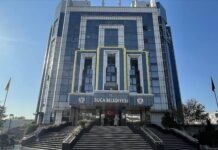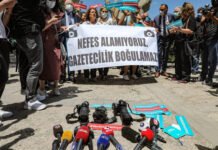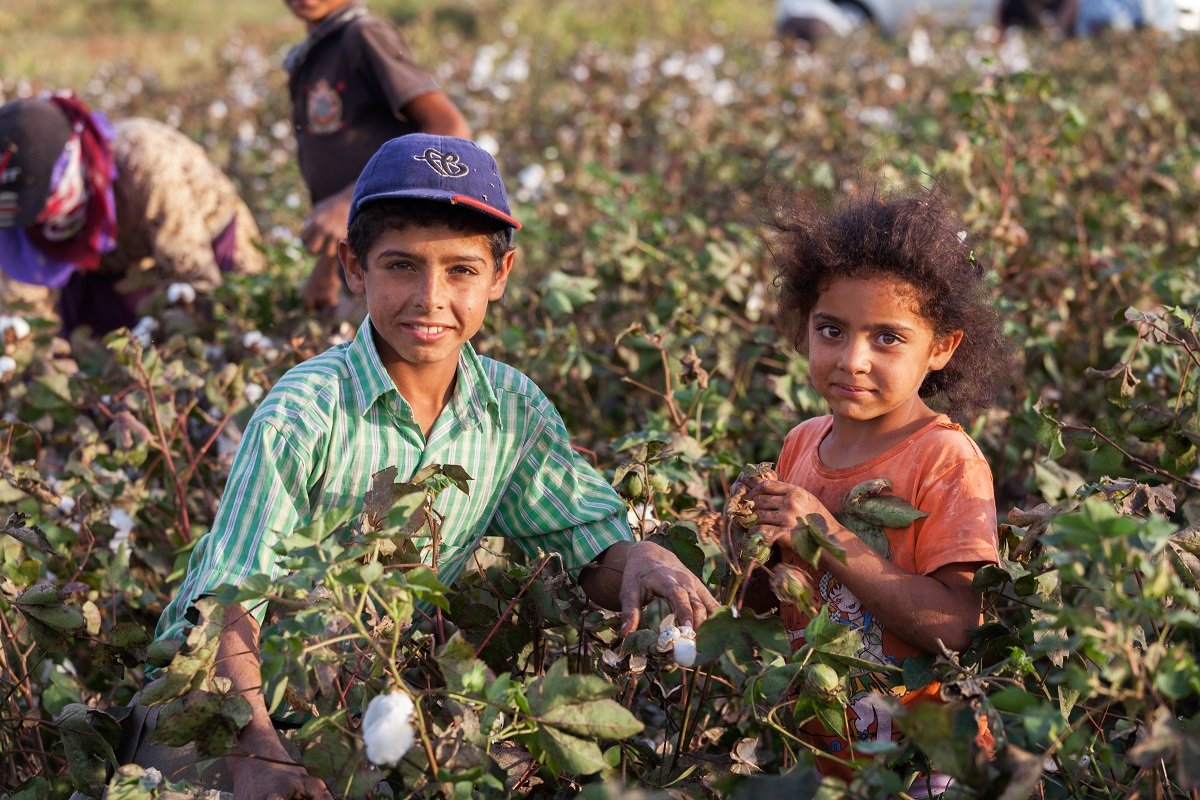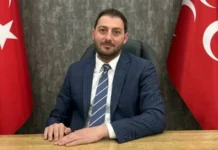Turkey’s pro-Kurdish Peoples’ Democratic Party (HDP) deputy Aycan İrmez has submitted a parliamentary proposal to investigate the Roboski (Uludere) Massacre, where 34 people were hit and killed by Turkish fighter jets on December 28, 2011, on its sixth anniversary.
HDP’s İrmez has stated the reasoning of the motion as follow: “From the founding of the Republic to this day, the Kurdish people have suffered countless tragedies and have been subjected to suffering that will remain in the collective memory for centuries. One of these tragedies is 34 civilians losing their lives in the Turkish Armed Forces jets’ bombing of Şırnak’s Uludere district on December 28, 2011.
“Impunity on this incident marked on collective memory as the Roboski Massacre is a concrete example of how far low Turkey’s legal system has been dragged by the government’s hands. After the Roboski Massacre, the then-Prime Minister Recep Tayyip Erdoğan had said this massacre would not get lost in the back corridors of Ankara and that it would be brought to light no matter what it would cost. In the six years since, there has been no developments regarding this massacre.”
In the motion, İrmez pointed to the impunity regarding the massacre and asked who gave the fighter jets the orders to hit the village and demanded an explanation for the following points mentioned in the motion:
“On May 23, 2012, then Interior Minister İdris Naim Şahin stated that the commanders who examined the images [of smuggling activities at the border] at Ankara Air Forces base, gave orders for the bombardment.
On August 5, 2012, Diyarbakır Chief Prosecutor’s Office confirmed a report by Wall Street Journal, reporting that images were taken by drones ahead of the incident and that villagers could be identified in these images.
The fact that National Security Council (MGK) had held a meeting on the day of the incident and that the National Intelligence Organisation (MİT) had informed the General Staff ahead of the massacre constitutes an evidence, that the massacre was planned and the orders were carried out within the chain of command.
On January 7, 2014, the General Staff’s Military Prosecutor’s Office issued a verdict of non-prosecution regarding the murder of 34 civilians by bombs. As a reason, the prosecutor’s office cited that “the Turkish Armed Forces staff had taken action in accordance with the decision taken by the Parliament and the Cabinet, and had acted by consent from the General Staff.
“Unfortunately, instead of taking steps to investigate the murders of Roboski and ease public conscience, the government has jailed HDP Şırnak deputy and a relative of Roboski victims Ferhat Encü,” said İrmez and added that “What happened in Roboski should be faced with an understanding of universal justice. There are clear clauses on the clear violation of security forces against civilians on the day of December 28 with regards to international law in the Geneva Convention.”
İrmez stressed that the word “massacre” used in their proposals regarding the Roboski Massacre being considered “rude and hurtful” and returned by the Parliament Speaker’s Office does not negate the fact that 34 civilians have been massacred.
“As a requirement of social harmony, conscience and the rule of law, the Roboski Massacre must be brought to light without delay,” said İrmez and added that “A transparent and neutral investigation of the Roboski Massacre, which is one of the most significant massacres of the recent history of Turkey and has created social and conscientious outrage in a very large portion of the country, is vital. In this context, we urgently demand a Parliamentary Inquiry with the purpose of finding the perpetrators who caused the deaths of the massacred citizens in Roboski, investigating the massacre with all its aspects and determining which precautions need to be taken.”
Selahattin Demirtaş, imprisoned co-chairman of HDP, has also commemorated the Roboski Massacre in a letter he sent from the prison. Demirtaş said the only crime of the victims, 17 of them teenagers, was to trade between two parts of their homeland divided by Turkish-Iraqi borderline.
Demirtaş’s message was read out to an audience, among them relatives of the victims, during an HDP commemoration in İstanbul for the sixth anniversary of the massacre, the party’s website said. “I looked at the bodies of the murdered children, wrapped in blankets and smelling of motor oil at the hospital corridors and rooms. In one of the rooms, I stayed alone with them for several minutes. I could almost hear the kids speaking to me,” Demirtaş said, remembering his visit to Şırnak’s Uludere district the morning of the day after the air assault.
“They killed us, they told me. And you are late. We were poor. And our sole crime was trying to make a living by crossing a border that divides our homeland. Our country is shattered, and so are we, they said,” the letter by the HDP leader read.
Demirtaş said he then vowed to take those responsible in front of justice, adding the reason he was in prison for 13 months now was his commitment to that promise by not kowtowing to the administration of Erdoğan.
Meanwhile, on Wednesday the governor of Şırnak put a ban on planned public commemorations in the village of Roboski on the sixth anniversary of the killings, citing the country-wide state of emergency law. Relatives of the victims were warned that this year only one person from each family could visit the village cemetery where their loved ones were buried, whereas kids studying at the local primary school were informed that they could not miss any classes on Thursday. However, upon pressure from the public, the governorate later withdrew the ban, Veli Encü said on Twitter, an activist from Roboski and relative of several of the victims from the same family.
Representatives of HDP, main opposition Republican People’s Party (CHP), human rights organizations and NGOs have announced their participation in Thursday’s memorial in Roboski, despite heightened militarization in the area.
Meanwhile, the so-called Executive Council Co-Presidency of the outlawed Kurdistan Communities Union (KCK) has claimed that the order for the Roboski Massacre was given by Turkish autocratic President Recep Tayyip Erdoğan (then Prime Minister) personally and alleged that “There are new Roboski Massacres every day against the Kurdish people”.
Issuing a written statement on the 6th anniversary of the Roboski Massacre, KCK has stated that the massacre was planned and added that the state wanted to add another trauma to the traumas the Kurdish people have experienced. “This massacre was executed in such cold blood and in such a planned way that the government and state officials treated this massacre as a normal incident. The then-Prime Minister Erdoğan celebrated the attack, instead of making the perpetrators answer for the massacre,” claimed the KCK.
According to a report by pro-Kurdish Fırat news agency, in the evening of December 28, 2011, a group of people from Roboski went to do what they would normally do, “border trade.” They went as usual within the knowledge and sight of local military units which had already emptied all military sites in the region and smoothed the way for border traders one month before the massacre took place.
On their way back from the border, the people in the group saw that soldiers had closed all three alternative ways to the village. They were subjected to a warning shot and artillery fire without being warned to stop.
Ubeydullah Encü, father of 13 years-old Muhammed Encü, who also lost his life that night, told that he had called the commander at the military post near the village and informed him that a group of people, including his child, was in the mentioned area. The commander told Encü that he knew about the people there and replied that they just fired a warning shot for intimidation. However, things didn’t work that way and their children were targeted by the bombs of F-16 warplanes.
The villagers who rushed to the scene after the bombardment tell that 13 people were still alive and the bodies of others were still burning when they reached there. These people, who on the way encountered soldiers returning from the region on order, had to carry the wounded survivors with their own efforts as no officials went to the scene despite the fact that they had informed all authorities soon after the incident.
Soldiers in the nearby military posts has also allegedly denied permission to health care teams from Şırnak to go to the scene as the bodies of victims and the injured were being taken away from there. “We gathered the parts of their bodies and tried to take them to our village in the saddles of donkeys that survived the bombardment,” said Encü.
All villagers, who were there that day, know that many of the wounded bled and/or freeze to death. Seventeen out of 34 victims were children aged under 18. Anyone who visits the village once can apparently see what sort of a trauma it has caused. The people in the village have been suffering from psychological depression since that day, six years ago.
On June 11, 2013, Public Prosecution of Diyarbakır issued a decision of non-jurisdiction on the case due to “reckless homicide” and sent the case to Military Prosecution of General Staff. Military Prosecution decided not to prosecute the case further on January 7, 2014. Lawyers of the victims’ families objected to the decision, but they were rejected.
Following this, the case was brought before the Constitutional Court. In a preliminary administrative examination of the application and its attachments, the court demanded some missing documents in the application be submitted yet the application was rejected on February 24, 2015 due to “outstanding documents not being submitted in time.”
The 281 applicants affected by Roboski Massacre made an application to the European Court of Human Right (ECtHR) on August 23, 2016 claiming human rights violations and particularly the right to life.















